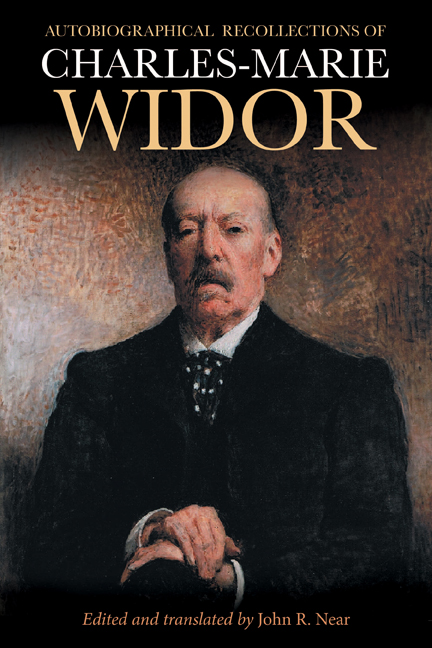Book contents
- Frontmatter
- Contents
- List of Illustrations
- Foreword
- Preface
- Acknowledgments
- Introduction: Tribute to Charles-Marie Widor
- Part One Studies, Early Performances, and Aristide Cavaillé-Coll (1844–69)
- Part Two La Belle Époque: The Franco-Prussian War to The Great War (1870–1914)
- Part Three The Great War and Important Initiatives (1914–37)
- Appendix 1 Birth record of Charles-Marie Widor, 1844
- Appendix 2 Widor’s Diplôme de Bachelier ès Lettres, 1863
- Appendix 3 Widor’s letter of appreciation to Jacques Lemmens, 1863
- Appendix 4 Brussels Ducal Palace organ specification, 1861
- Appendix 5 Widor’s certificate for Chevalier de l’Ordre du Christ, 1866
- Appendix 6 “To Budapest,” 1893
- Appendix 7 Widor’s travels to Russia and his 1903 passport
- Appendix 8 Widor’s list of his works in 1894
- Appendix 9 The Paris Conservatory organs, 1872
- Appendix 10 Chronique [Widor’s appeal for an organ hall at the Paris Conservatory, 1895]
- Appendix 11 Widor’s certificate for the Académie Royale, Brussels, 1908
- Appendix 12 “Debussy & Rodin,” 1927
- Appendix 13 The American Conservatory organ, Fontainebleau, 1925
- Appendix 14 Letters concerning the Trocadéro organ restoration, 1926
- Notes
- Bibliography
- Index
- Eastman Studies in Music
34 - World War I and Maxim’s
Published online by Cambridge University Press: 09 May 2024
- Frontmatter
- Contents
- List of Illustrations
- Foreword
- Preface
- Acknowledgments
- Introduction: Tribute to Charles-Marie Widor
- Part One Studies, Early Performances, and Aristide Cavaillé-Coll (1844–69)
- Part Two La Belle Époque: The Franco-Prussian War to The Great War (1870–1914)
- Part Three The Great War and Important Initiatives (1914–37)
- Appendix 1 Birth record of Charles-Marie Widor, 1844
- Appendix 2 Widor’s Diplôme de Bachelier ès Lettres, 1863
- Appendix 3 Widor’s letter of appreciation to Jacques Lemmens, 1863
- Appendix 4 Brussels Ducal Palace organ specification, 1861
- Appendix 5 Widor’s certificate for Chevalier de l’Ordre du Christ, 1866
- Appendix 6 “To Budapest,” 1893
- Appendix 7 Widor’s travels to Russia and his 1903 passport
- Appendix 8 Widor’s list of his works in 1894
- Appendix 9 The Paris Conservatory organs, 1872
- Appendix 10 Chronique [Widor’s appeal for an organ hall at the Paris Conservatory, 1895]
- Appendix 11 Widor’s certificate for the Académie Royale, Brussels, 1908
- Appendix 12 “Debussy & Rodin,” 1927
- Appendix 13 The American Conservatory organ, Fontainebleau, 1925
- Appendix 14 Letters concerning the Trocadéro organ restoration, 1926
- Notes
- Bibliography
- Index
- Eastman Studies in Music
Summary
On the first Sunday of the 1914 war, M. and Mme Pichon came to lunch at Foyot's where I was having lunch in the next room with a very beautiful woman from Rome, the Comtesse de Cossato, of remarkable intelligence and who was returning to Italy the next day. Everyone was very stirred up. Countess Cossato was asking if the English would come to our aid: “But what is the English fleet doing?” —“Yes, yes,” said Pichon, deeply emotional. Countess Cossato remarked to me at one point: “Look at the wife of your minister of foreign affairs; she's crying into her eggs!”
I heard the French mobilization proclaimed by the rural constable in front of the church of Ville d’Avray. I was coming back from Versailles where I had gone to pick up some friends by car.
On September 2, [1914], Étienne Lamy, permanent secretary of the Académie Française came to see me and said, “Raymond Poincaré is asking the permanent secretaries to pack their bags so as not to be taken hostage. I’m leaving tonight,” he added. We deliberated all day. At six o’clock in the evening we held a meeting at Albert Sarraut's place, at the Ministry of Public Education. “I have no orders to give you,” he said, “but the effect of your leaving would be disastrous.” While we were talking with him, there was a sudden burst of heavy platoon fire under our windows; it was one of the first German planes to drop its bombs on the capital, to which the battalion of Zouaves responded from the barracks on rue de Bellechasse. We drew the curtains so that we could hear each other, and in the end we decided not to leave. “As for me,” said the minister, “I am leaving for Bordeaux this evening!”
On the other hand, the minister of the interior gave us seventeen laissezpasser, allowing us to leave Paris. I remember Bonnat's indignation when I brought him one of those passes: “Do you think I’m going to abandon my house, the Beaux-Arts, for which I am responsible, my students, and my collections? Who do you take me for? Get out! Go away!” So we stayed in Paris, which became ominous as soon as night fell; everyone remembers that the shops and restaurants closed early. Maxim's was our refuge.
- Type
- Chapter
- Information
- Autobiographical Recollections of Charles-Marie Widor , pp. 71 - 73Publisher: Boydell & BrewerPrint publication year: 2024



